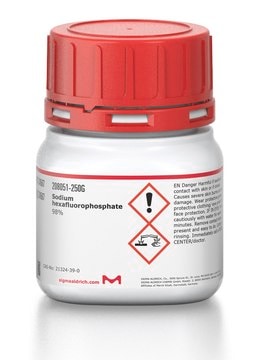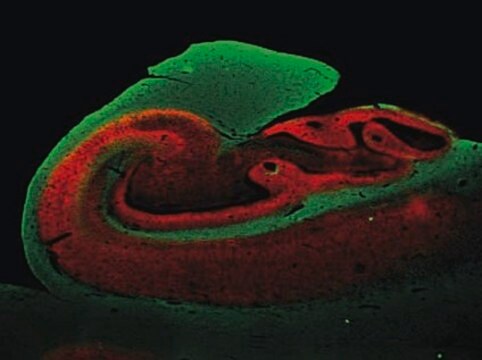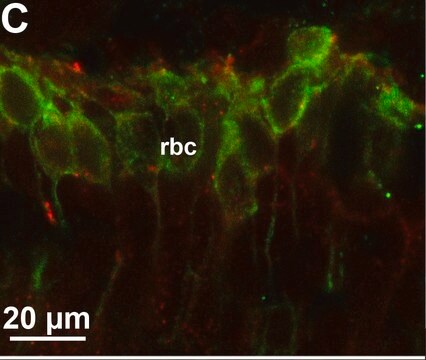MAB329-C
Anti-Synaptophysin Antibody, clone SP15 (Ascites Free)
clone SP15, from mouse
Sinónimos:
Major synaptic vesicle protein p38, Synaptophysin
About This Item
Productos recomendados
biological source
mouse
Quality Level
antibody form
purified antibody
antibody product type
primary antibodies
clone
SP15, monoclonal
species reactivity
human, monkey, feline, rat, mouse
technique(s)
ELISA: suitable
immunocytochemistry: suitable
immunohistochemistry: suitable
western blot: suitable
isotype
IgMκ
NCBI accession no.
UniProt accession no.
target post-translational modification
unmodified
Gene Information
human ... SYP(6855)
Categorías relacionadas
General description
Immunogen
Application
Neuroscience
Developmental Neuroscience
Western Blotting Analysis: A representative lot detected synaptophysin in rat hippocampal tissue extracts (Lin, D., et al. (2012). Behav. Brain Res. 228(2):319-327).
Western Blotting Analysis: Representative lots detected synaptophysin in mouse brain synaptosomes preparations (Shim, S.Y., et al. (2008). J. Neurosci. 28(14):3604-3614).
Western Blotting Analysis: A representative lot detected synaptophysin in the large dense-core vesicles-containing fractions obtained by sucrose gradient centrifugation of rat brain median eminence (ME) neuroterminals preparations (Yin, W., et al. (2007). Exp. Biol. Med. (Maywood). 232(5):662-673).
Immunohistochemistry Analysis: A representative lot detected a stronger synaptophysin immunoreactivity in the inner molecular layer of frozen dentate gyrus sections from a 3-week old monkey, while a stronger immunoreactivity was seen in the outer molecular layer of dentate gyrus sections from a 13-year old monkey (Lavenex, P., et al. (2007). Dev. Neurosci. 29(1-2):179–192).
Immunohistochemistry Analysis: A representative lot immunostained nerve terminals at palisade ending using cat extraocular muscle (EOM) whole mount sections (Konakci, K.Z., et al. (2005). Invest. Ophthalmol. Vis. Sci. 46(1):155-165).
Immunohistochemistry Analysis: A representative lot detected synaptophysin immunoreactivity in human brain tissue sections (Honer, W.G., et al. (1993). Brain Res. 609(1-2):9-20).
Immunocytochemistry Analysis: A representative lot detected punctate synatophysin immunoreactivity among cultured primary cerebrocortical neurons from rat embryos (Bragina, L., et al. (2006). J. Neurochem. 99(1):134-141.).
ELISA Analysis: Representative lots were employed as the capture antibody for the detection of synaptophysin in human temporal cortex, frontal cortex, and cerebellar cortex extracts by sandwich ELISA (Klucken, J., et al. (2006). Acta Neuropathol. 111(2):101-108; Fukumoto, H., et al. (2002). Arch. Neurol. 59(9):1381-1389).
Quality
Western Blotting Analysis: 1.0 µg/mL of this antibody detected Synaptophysin in 10 µg of rat brain tissue lysate.
Target description
Physical form
Storage and Stability
Other Notes
Disclaimer
¿No encuentra el producto adecuado?
Pruebe nuestro Herramienta de selección de productos.
Optional
Storage Class
12 - Non Combustible Liquids
wgk_germany
WGK 2
flash_point_f
Not applicable
flash_point_c
Not applicable
Certificados de análisis (COA)
Busque Certificados de análisis (COA) introduciendo el número de lote del producto. Los números de lote se encuentran en la etiqueta del producto después de las palabras «Lot» o «Batch»
¿Ya tiene este producto?
Encuentre la documentación para los productos que ha comprado recientemente en la Biblioteca de documentos.
Nuestro equipo de científicos tiene experiencia en todas las áreas de investigación: Ciencias de la vida, Ciencia de los materiales, Síntesis química, Cromatografía, Analítica y muchas otras.
Póngase en contacto con el Servicio técnico








